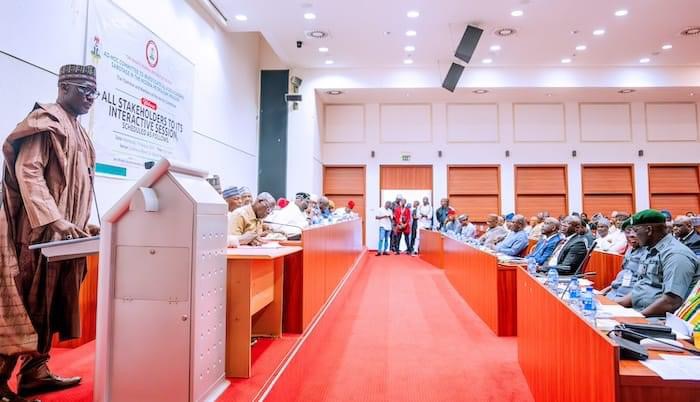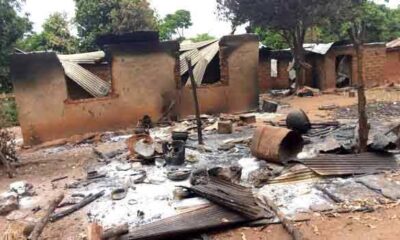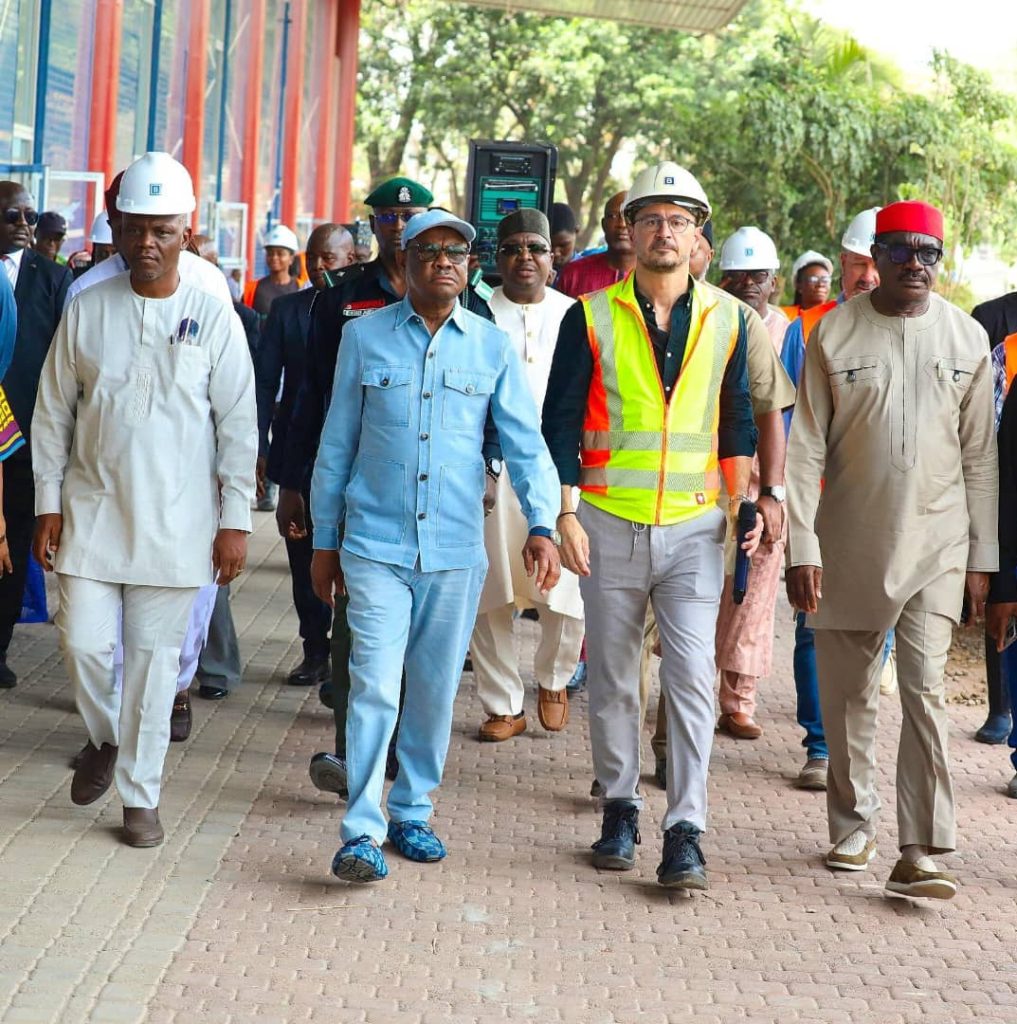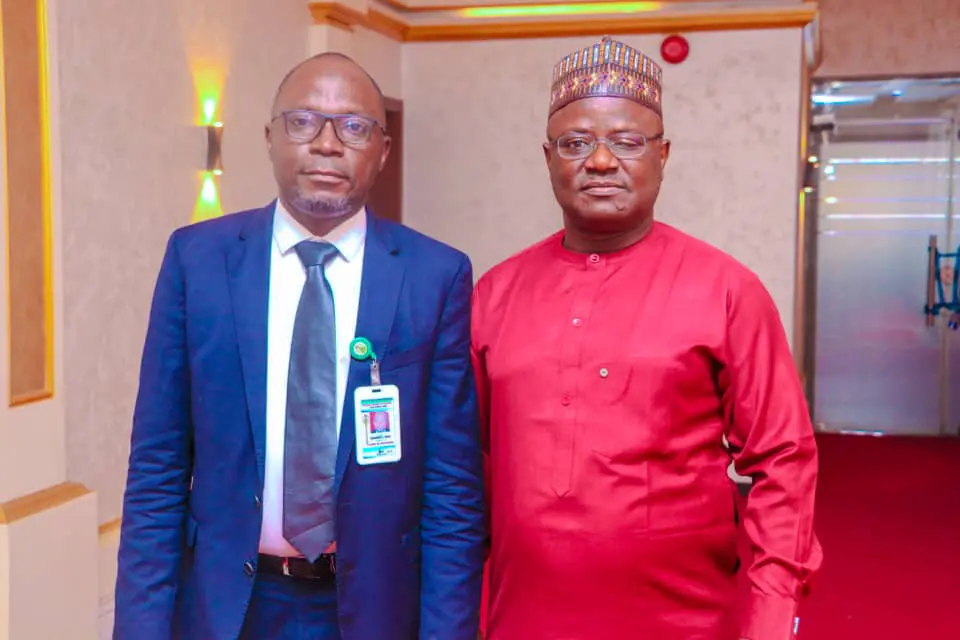Politics
We Are Neither Thieves Nor Saboteurs, Mele Kyari Defend NNPCL
Published
8 months agoon
By
Ekwutos Blog
“We are not criminals. We are not thieves. But we will protect our dignity and honour,” says NNPC GCEO Kyari.
The Group Chief Executive Officer, NNPC, Mele Kyari, on Wednesday at the interactive session organised by the Senate Adhoc Committee probing sabotage in the oil and gas sector, chaired by the Senate Leader, Opeyemi Bamidele, declared that the leadership of the NNPC are neither thieves or economic saboteurs.
This was as stakeholders in the oil and gas sector of the Nigerian economy agreed to expose all forms of sabotage and criminal activities bedeviling the sector not minding whose ox is gored.
Participants at the Senate Adhoc Committee probing sabotage in the oil and gas sector, chaired by Bamidele, further agreed that the investigative public hearing should be aired live on national televisions and other media platforms.
Authorities of the Nigerian National Petroleum Company Limited (NNPC) and the Dangote Refinery and Petrochemical Company also seized the opportunity to clear the air on the recent face-off between the two establishments.
While the NNPCL management distanced the organisation from any form of sabotage and accusation of deliberately stalling the take-off of private refineries in the country, the Dangote firm denied allegation of attempt to monopolise the oil and gas sector in the country.
In his submission, the Group Chief Executive Officer, NNPC, Mele Kyari, stressed that the NNPC, “is loyal and faithful to the country,” adding that its management vowed to protect the interest of Nigeria in the petroleum industry.
He observed that most problems in the petroleum industry have nothing to do with NNPCL.
“We are faithful and loyal to the economic interest of this country. We are not criminals. We are not thieves. But we will protect our dignity and honour,” he added.
The NNPC boss said it was not possible to frustrate any private refinery because the Petroleum Industry Act had limited the roles of each regulator in the oil and gas sector.
He said, “The NNPC is a company owned by over 200 million Nigerians. And I happen to be the chief executive of this company. The law is clear around what the chief executive of this company will do.
“Our memorandum article of association, the Petroleum Industry Act, and all other enabling, including the Company and Allied Matters Act, (CAMA), which was legislated by this Honourable National Assembly had listed our roles.
“I will wait for the public hearing to reveal certain things. I also agree with the Minister that it should be broadcast live so that Nigerians will hear us. So that all the misinformation that you see today will be put to the side, so that Nigerians will know the truth.
“All of us here see what is happening in the media. Targeted personal attack on my person, on the institution, and we all know how this works. They are deliberate, they are calculated.
“It creates the impression that NNPC Limited and our leadership are doing something to create economic sabotage in our country. It is far from it.
“I assure you, Mr. Chairman, that the NNPC Limited and its board of directors and its shareholders are faithful, loyal to this country.”
Kyari added: “We do not lie to this country. And we do nothing to sabotage the economic interests of this country. As a matter of fact, NNPC is the economic interest of this country.”
In its response, Dangote Refinery, through its Group Strategy Officer, Aliyu Suleiman, said the firm had so far, bought about 50 million barrels of crude.
Sulaiman said, “About 60 per cent of that came from the NNPC, and we are thankful to them for their support. And we’re grateful to them for their support.
“About 20 per cent of that (crude) had to be imported from outside and the other 20 per cent we purchased.
“Essentially, all we are asking for, and let’s be very clear, we are happy to pay fair prices.
“We are very happy with the price that they set, the price is like supermarkets and that’s what we buy. But what we buy from others is what we think the regulator should look at and the good thing the regulator has done, is that it has published a guideline that will address some of these.
“We hope that we’ll work with the regulator and we’ll get their support so that the refinery can get 100 per cent of its crude from Nigeria and buy the crude from companies that produce it in Nigeria not from international middlemen.
“Whatever the prices, as long as it is in Nigeria, and that’s the price also that the producer will pay their tax on, we’ll be happy to pay that.
“Since the refinery started full trial production in January and then full time production started in March, since then we have processed about 50 million barrels
“We’ve produced about five million tons of petroleum products. And these petroleum products have been sold to various parts of the country.
“Jet fuel has been sold in Europe since May. It’s been sent to Europe. Other products have been sent to places as far as Asia, US, Brazil, and so on. So the refinery has been making a lot of progress.
“We have produced five million tons of products, but about 90 per cent of it had to be exported. While at the same time, the products we were producing had been imported into Nigeria.
“We find ourselves competing against Russian products that have been produced with oil that is valued at $60. “We all know that because of the cap that has been put on, put on Russian oil, the value of Russian oil today in the market is $60.
“That’s what Russia is using to produce their products and those products are being sent in large quantities into Africa to compete with products that are produced in refineries that buy crude at $90.
“We don’t think this will be a fair competitive environment. It is normal to put protective measures. The US, for example, has done that, to protect their own industries against attack by China that subsidise their own industries and then sends them to the US.”
Meanwhile, the Senate panel on the occasion raised questions over the $1.5 billion approved in 2021, for the turn-around maintenance of the Port Harcourt Refinery with little or no result.
Consequently, the upper chamber lamented that it was unfair and wrong to treat government businesses or public companies as an orphan while private businesses were flourishing and thriving.
Bamidele, who is the Leader of the Senate and Chairman, of the ad hoc panel investigating the Alleged Economic Sabotage in the Nigerian Petroleum Industry said the Federal Executive Council had approved the plan by the Ministry of Petroleum Resources to rehabilitate and turn around the Port Harcourt Refinery with a whopping sum of $1.5 billion under the administration of former President Muhammadu Buhari.
He noted that despite the huge investment, the government-owned refinery was yet to function effectively, a situation that compelled the country to depend almost entirely on the importation of petroleum products.
Bamidele, expressed grave concerns about the dysfunctionality of the government-owned refineries despite billions of dollars invested to carry out turn-around maintenance on the installation.
He observed that the federation, “is undergoing a truly challenging period,” pointing out that the distribution and supply of refined petroleum products, “has been irregular and problematic in the recent history of our fatherland.”
“In 2021, specifically, the Federal Executive Council approved $1.5 billion for the turn-around maintenance of the Port Harcourt Refinery. Yet, this investment has not yielded significant returns.
“For us, in the Senate, we believe, it is unfair and unpatriotic to treat government businesses or public corporations as an orphan while private businesses are flourishing and thriving,” Bamidele pointed out at the interactive session.
The session was attended by Minister of Finance and Coordinating Minister of the Economy, Mr. Wale Edun; Minister of State (Petroleum), Senator Heineken Lokpobiri; and Kyari. Others included the Chief Executive Officer, Nigerian Upstream Petroleum Regulatory Commission (NUPRC), Mr. Gbenga Komolafe; the Chief Executive Officer, Nigerian Midstream and Downstream Petroleum Regulatory Authority, Mr. Farouk Ahmed, major and independent oil marketers, among others
In his own remarks, Edun said the increase in the crude volume would stabilise the country’s foreign exchange market while expressing confidence in the leadership of the ad-hoc committee to conduct an unbiased and impartial investigation.
Meanwhile, the Minister of State for Petroleum Resources, Senator Heineken Lokpobiri, has pledged the full cooperation of the ministry with the senate which is investigating the sector.
“ In view of the fact that the quickest means to overcome our economic challenges lies within the petroleum sector, there is a need to keep Nigerians in the know of procedures and processes being carried out in our effort to transform and reposition our oil sector, bearing in mind the need to protect and promote our local players in the industry.
“I emphasised on this during my appearance before the Senate Adhoc Committee investigating alleged economic sabotage in the Nigerian petroleum industry, where I expressed my commitment to cooperating with the committee to put to rest some of the misinformation making rounds.
“The federal government, under President Bola Tinubu, remains committed to fostering the necessary synergy and partnerships to achieve our goals, and we are expediting efforts to complete rehabilitation works on our three refineries to ensure we meet our domestic petroleum needs efficiently,” Lokpobiri said on his X handle.
The National President of Independent Petroleum Marketers Association of Nigeria (IPMAN), Alhaji Abubakar Shettima in his presentation admonished the committee against monopoly in the petroleum sector.
“The current value chain in the downstream should be sustained to allow other investors to participate.
“NNPCL is doing its best but should please improve on supply of products to retail outlets across the country to end the incessant queue at filling stations,” he said
Follow trueTALKnija for more exclusive updates
You may like


PRESIDENT TINUBU CONDEMNS LATEST ATTACK IN PLATEAU, CHARGES GOVERNOR MUTFWANG WITH RESOLVING UNDERLYING COMMUNAL ISSUES


Wike hails 95% implementation of FCT 2024 budget, unveils key projects


Benue Govt moves to block Peter Obi’s visit amid Alia’s defection rumours


Nasarawa Assembly confirms new clerk, deputy


Rivers: Refund N300m Fubara gave you – Ibas tells NBA


War: Ukraine loses 235 soldiers in 24 hours
Politics
Wike hails 95% implementation of FCT 2024 budget, unveils key projects
Published
2 hours agoon
April 14, 2025By
Ekwutos Blog
The Minister of the Federal Capital Territory (FCT), Barr. Ezenwo Nyesom Wike, has announced a landmark 95 percent implementation of the 2024 statutory budget, describing the achievement as unprecedented in the history of the FCT.
Wike made this known during a media briefing after inspecting several critical infrastructure projects across the Territory, including major roads at Life Camp and Katampe, as well as the ongoing renovation of the International Conference Centre, Abuja.
“I can tell you we’ve done not less than 95 percent of the budget implementation. That is historic. It has never happened before. And if you look at the projects there, you will see that there is no project that is in the 2024 budget that we have not touched,” he stated.
He attributed the progress to the National Assembly’s decision to extend the lifespan of the 2024 FCT statutory budget until June 2025, which he said enabled the Administration to sustain funding and accelerate delivery on major projects.
Wike also revealed that the 2025 statutory budget had already been submitted to the National Assembly and expressed hope that its timely passage would maintain the current momentum and support the completion of key infrastructure across the FCT.
During the tour, the Minister expressed satisfaction with the pace and quality of work, commending contractors for adhering to timelines and maintaining high standards.
Among the projects visited was the 4-kilometer six-lane dual carriageway linking Life Camp Junction to Ring Road III, currently under construction by Julius Berger. Once completed, the road will significantly improve connectivity between the districts of Kado, Karmo, Gwarimpa I, Dape, Ido-Gwari, Saburi, and Dei-Dei.
Another major project nearing completion is the access road from Nnamdi Azikiwe Expressway (by N16) to the Judges’ Quarters in Katampe District. This route will also connect the N20 (Wole Soyinka Way) in Jahi District with Katampe and Maitama, enhancing mobility in the area.
Wike expressed particular delight at the progress of the International Conference Centre renovation, which he described as rapidly advancing.
“These projects will be inaugurated by Mr. President during his second-year anniversary celebrations. We have gone to the International Conference Centre, which is almost ready. The first phase of the N5 will also be ready by the end of May,” he said.
Politics
Benue Govt moves to block Peter Obi’s visit amid Alia’s defection rumours
Published
3 hours agoon
April 14, 2025By
Ekwutos Blog
The Benue State Government is reportedly making moves to block a planned visit by Labour Party presidential candidate in the 2023 general election, Mr Peter Obi, to camps housing Internally Displaced Persons (IDPs) in the state.
Obi, whose post-election activities have prominently included humanitarian outreach to victims of violence across the country, was said to have planned a visit to some of the IDP camps in Benue.
The former Anambra State governor, in recent weeks, visited IDP camps in Plateau, Southern Kaduna and Nasarawa states, meeting with displaced families, donating relief materials and advocating for urgent government intervention.
His visit to Plateau State drew national attention after he held talks with Governor Caleb Mutfwang and visited victims of herdsmen attacks.
According to reliable sources, Obi’s team had reached out to the Benue State Emergency Management Agency (BSEMA) through its Executive Secretary, Sir James Iorpuu, to officially notify the agency and seek access to designated camps for the visit.
However, it appears the move has sparked a political storm within Benue’s corridors of power.
Top government officials reportedly advised Governor Alia against granting Obi access to the IDP camps, citing political undertones.
The visit, they argued, could be perceived as a calculated move by former Governor Samuel Ortom, a staunch supporter of Peter Obi during the 2023 presidential election, to revive his political relevance and embarrass the current administration.
Beyond the Ortom factor, sources also revealed that the decision to stop Obi’s visit was influenced by wider political calculations.
“It is believed that allowing Obi access at this time could fuel ongoing speculations that Governor Alia is considering leaving the All Progressives Congress (APC) amid tensions with some national leaders of the party.
“The governor is very conscious of his relationship with the Presidency and party hierarchy. Allowing Obi’s visit would not only trigger local political drama with Ortom but might also be interpreted in Abuja as a subtle alignment with the opposition at a time when Alia is battling internal party issues. This is not the kind of message he wants to send to the President.
“Such an association, especially with a high-profile opposition figure like Obi, could be politically damaging for Alia, who has been working to consolidate his hold on the state and maintain good standing with President Bola Tinubu’s administration,” a source told Ekwutosblog on Monday.
It would be recalled that in the February 25, 2023 presidential poll, Obi pulled a stunning performance in Benue State, securing over 308,000 votes, a figure that shocked many given the dominance traditionally enjoyed by the two major parties – APC and PDP.
His victory in the state was largely attributed to the support of Ortom and a groundswell of youth-driven, faith-based and middle-class backing.
Following this backdrop, sources disclosed that Governor Alia was convinced by his inner circle to forestall Obi’s visit to avoid reigniting political rivalries or offering Ortom and the Labour Party a platform to reassert influence in the state.
As a result, the governor reportedly instructed his Chief Press Secretary, Tersoo Kula, to issue a public statement cautioning against what it described as “unapproved high-profile visits” to the state.
“For anyone considering a visit to Benue State without the Governor’s knowledge, it is imperative to reconsider such plans, as the safety and security of individuals in this regard cannot be guaranteed,” he warned.
Though the statement fell short of directly naming Peter Obi, insiders confirmed that it was a veiled warning aimed at dissuading the former presidential candidate from proceeding with his proposed outreach.
One government source, speaking anonymously, said, “The governor is not comfortable with Obi’s visit, especially with the political undertones it carries.
“The camps are a sensitive issue and we cannot allow anyone to politicise the suffering of our displaced people.”
As of the time of filing this report, neither Obi’s camp nor the Labour Party has issued an official statement regarding the restriction.
However, a source close to the former governor disclosed that the visit was purely humanitarian and part of Obi’s ongoing national outreach to communities affected by violence and displacement.
Politics
Nasarawa Assembly confirms new clerk, deputy
Published
4 hours agoon
April 14, 2025By
Ekwutos Blog
The Nasarawa State House of Assembly resumed plenary on Monday after the Sallah break, confirming Mr. Ibrahim Abdulazeez Musa as the substantive Clerk of the House.
The confirmation was announced by the Speaker, Dr. Danladi Jatau, during proceedings in Lafia.
Musa had been serving in an acting capacity since December 6, 2023, following the ill health of the former Clerk, Mr. Ego Maikeffi Abashe, who passed away on March 1, 2025.
In the same session, the Speaker also announced the appointment of Mr. Paul Okugya as the Deputy Clerk of the House. Prior to his new role, Okugya served as Director of Protocol.
The Speaker congratulated both appointees on their elevation and wished them success in their new responsibilities.
Jatau also led members of the Assembly in observing a minute of silence in honour of the late Clerk, Mr. Abashe.
Meanwhile, two bills were introduced for first reading during the plenary session.
The first, a private member bill, titled “A Bill for a Law to Establish Lafia General Hospital and Other Related Matters Thereto,” was presented by Hon. Solomon Yakubu Akwashiki, who represents Lafia Central Constituency.
The motion was seconded by Barr. Esson Mairiga, member representing Lafia North Constituency.
The second bill on the order paper was “A Bill for a Law to Amend the Re-enacted Nasarawa State House of Assembly Service Commission Law 2023 and Other Incidental Matters Thereto.”
The motion for first reading was moved by the House Leader, Hon. Suleiman Azara, and seconded by the Minority Leader, Hon. Luka Iliya Zhekaba.
The bill has been scheduled for second reading on April 29, 2025, while deliberation on Hon. Akwashiki’s bill is slated for April 28, 2025.

PRESIDENT TINUBU CONDEMNS LATEST ATTACK IN PLATEAU, CHARGES GOVERNOR MUTFWANG WITH RESOLVING UNDERLYING COMMUNAL ISSUES

Wike hails 95% implementation of FCT 2024 budget, unveils key projects

Benue Govt moves to block Peter Obi’s visit amid Alia’s defection rumours
Trending

 Trending6 months ago
Trending6 months agoNYA demands release of ‘abducted’ Imo chairman, preaches good governance
- Business6 months ago
US court acquits Air Peace boss, slams Mayfield $4000 fine

 Politics6 months ago
Politics6 months agoMexico’s new president causes concern just weeks before the US elections
- Entertainment6 months ago
Bobrisky transferred from Immigration to FCID, spends night behind bars
- Entertainment6 months ago
Bobrisky falls ill in police custody, rushed to hospital

 Politics6 months ago
Politics6 months agoRussia bans imports of agro-products from Kazakhstan after refusal to join BRICS

 Politics6 months ago
Politics6 months agoPutin invites 20 world leaders
- Politics1 year ago
Nigerian Senate passes Bill seeking the establishment of the South East Development Commission.

